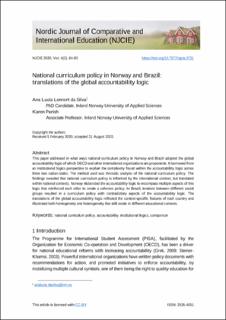National curriculum policy in Norway and Brazil Translations of the global accountability logic
Peer reviewed, Journal article
Published version
Date
2020Metadata
Show full item recordCollections
Original version
Nordic Journal of Comparative and International Education (NJCIE). 2020, 4 (2), 64-83. 10.7577/njcie.3721Abstract
This paper addressedin what ways national curriculum policy in Norway and Brazil adoptedthe global accountability logic of which OECD and other international organizations are proponents. It borrowedfrom an institutional logics perspective to explain the complexity found within the accountability logic across these two nation-states. The method used was thematic analysis of the national curriculum policy. The findings revealed that national curriculum policy is informed by the international context, but translated within national contexts. Norway elaborated the accountability logicto encompass multiple aspects of thislogic that reinforced each other to create a cohesive policy. In Brazil, tensions between different social groups resulted in a curriculum policy with contradictory aspects of the accountability logic. The translations of the global accountability logic reflected the context-specific features of each country andillustratedboth homogeneity and heterogeneity that still exists in different educational contexts.

